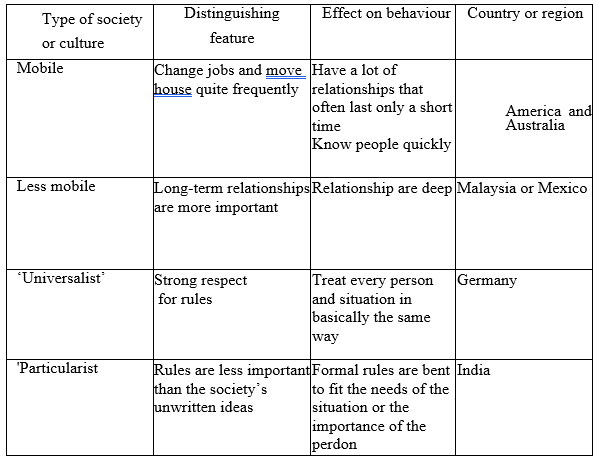Unit 2 cultural diversity bài tập tiếng anh lớp 12
A READING
Part 1. Read the passage and complete the table that follows.
There are questions from a cross-cultural workshop which helps business people to avoid misunderstandings when they deal with people who come from different cultures. Ideas about polite behaviour vary from one culture to another and it’s easy to cause offence, or feel offended, if you don’t know what other cultures expect.
Some societies, such as America and Australia, for example, are mobile and very open. People here change jobs and move house quite frequently. As a result they have a lot of relationships that often last only a short time, and they need to get to know people quickly. So it’s normal to have friendly conversations with people that they have just met, and you can talk about things that other cultures would regard as private.
At the other extreme are more crowded and less mobile societies where long-term relationships are more important. A Malaysian or Mexican business person, for example, will want to get to know you very well before he or she feels happy to start business. But when you do get to know each other, the relationship becomes much deeper than it would in a mobile society.
To Americans, both Europeans and Asians seem cool and formal at first. On the other hand, as a passenger from a less mobile society put it, it’s no fun spending several hours next to a stranger who wants to tell you all about his or her life and asks you all sorts of embarrassing questions that you don’t want to answer.
Cross-cultural differences aren’t just a problem for travellers, but also for the airlines that carry them. All airlines want to provide the best service, but ideas about good service vary from place to place. This can be seen most clearly in the way that problems are dealt with.
Some societies have ‘universalist’ cultures. These societies have a strong respect for rules, and they treat every person and situation in basically the same way.
‘Particularist’ societies, on the other hand, also have rules, but they are less important than the society’s unwritten ideas about what is right or wrong for a particular situation or a particular person. So the formal rules are bent to fit the needs of the situation or the importance of the person.
This difference can cause problems. A traveller from a particularist society, India, is checking in for a flight in Germany, a country which has a universalist culture. The Indian traveller has too much luggage, but he explains that he has been away from home for a long time and the suitcases are full of presents for his family. He expects that the check-in clerk will understand his problem and will bend the rules for him. The check-in clerk, however, expects that if she explains the rules, the customer will understand. If he was allowed to have too much luggage, it wouldn’t be fair to the other passengers. But the traveller thinks this is unfair, because the other passengers don’t have his problem.

Part 2. Complete the passage, using the word from the box that best fits each space.

Good personal relations based on mutual trust and esteem play a (1)_________important role in doing business in Japan. Hospitality given and received can play a(2)_________part in maintaining and establishing such relations. While in Japan it is (3)_________for the visitor to offer a meal in a restaurant or in his hotel: he is not expected to reciprocate entertaining on the Japanese scale.
The Japanese do not expect foreigners to understand the (4)_________ points of their own etiquette but they like people who try to conform. Shoes are removed before entering Japanese-style houses and restaurants.
Most Japanese meals consist of a series of small dishes. (5)_________, the polite thing to do is to eat what one is offered but Japanese hosts are understanding if a foreigner explains that he finds a (6)_________dish unappetizing.
In Japan it is the almost (7_________custom to exchange visiting cards when one makes a new acquaintance. This is useful to the foreign visitor, and it is (8)_________ to take a substantial number of cards (say at least 100) for use in
Japan. The custom of giving gifts to business and personal acquaintances is more (9)_________than in most other countries. Most of these gifts are (10)_________small items and it is not necessary to reciprocate (11)_________although it is customary to give something back in due course for personal presents received from individuals. It may be useful to take a number of souvenir items such as English china, company pens or ties to give away on(12) _________occasions. Very high quality Scotch whisky also makes an (13)_________gift. It is (14) _________ that all gifts should be (15) _________wrapped in gift wrapping paper.
Xem thêm Lesson 4 – Unit 2 – Cultural Diversity – Bài
Giải
A. READING
Part 1.

Part 2.
1. particularly 2. useful 3. enough
4. finer 5. Naturally 6. particular
7. invariable 8. advisable 9. common
10. fairly 11. immediately 12. suitable
13. acceptable 14. important 15. carefully




Trackbacks